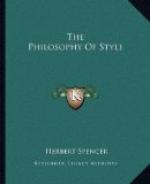48. The several circumstances here specified bring with them many appropriate associations. Our attention is rarely drawn by the buzzing of a fly in the window, save when everything is still. While the inmates are moving about the house, mice usually keep silence; and it is only when extreme quietness reigns that they peep from their retreats. Hence each of the facts mentioned, presupposing numerous others, calls up these with more or less distinctness; and revives the feeling of dull solitude with which they are connected in our experience. Were all these facts detailed instead of suggested, the attention would be so frittered away that little impression of dreariness would be produced. Similarly in other cases. Whatever the nature of the thought to be conveyed, this skilful selection of a few particulars which imply the rest, is the key to success. In the choice of component ideas, as in the choice of expressions, the aim must be to convey the greatest quantity of thoughts with the smallest quantity of words.
49. The same principle may in some cases be advantageously carried yet further, by indirectly suggesting some entirely distinct thought in addition to the one expressed. Thus, if we say, “The head of a good classic is as full of ancient myths, as that of a servant-girl of ghost stories”; it is manifest that besides the fact asserted, there is an implied opinion respecting the small value of classical knowledge: and as this implied opinion is recognized much sooner than it can be put into words, there is gain in omitting it. In other cases, again, great effect is produced by an overt omission; provided the nature of the idea left out is obvious. A good instance of this occurs in ‘Heroes and Heroworship.’ After describing the way in which Burns was sacrificed to the idle curiosity of Lion-hunters—people who came not out of sympathy, but merely to see him—people who sought a little amusement, and who got their amusement while “the Hero’s life went for it!” Carlyle suggests a parallel thus: “Richter says, in the Island of Sumatra there is a kind of ‘Light-chafers,’ large Fire-flies, which people stick upon spits, and illuminate the ways with at night. Persons of condition can thus travel with a pleasant radiance, which they much admire. Great honour to the Fire-flies! But—!—”
vi. The Effect of Poetry explained.
50. Before inquiring whether the law of effect, thus far traced, explains the superiority of poetry to prose, it will be needful to notice some supplementary causes of force in expression, that have not yet been mentioned. These are not, properly speaking, additional causes; but rather secondary ones, originating from those already specified reflex results of them. In the first place, then, we may remark that mental excitement spontaneously prompts the use of those forms of speech which have been pointed out as the most effective. “Out with him!” “Away with him!” are the natural utterances of angry




